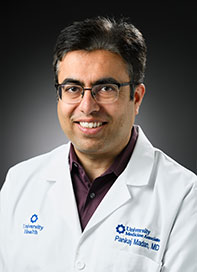You may be familiar with the term “high blood pressure,” but you may not be aware of your blood pressure levels. High blood pressure, also known as hypertension or HBP, can be a serious condition if left uncontrolled.
Not sure what your numbers are? Learn how to measure your blood pressure at home.
The American Heart Association estimates nearly half of all adults in the U.S., about 103 million, have high blood pressure. Of these, about 75% do not control their high blood pressure. These numbers are expected to rise due to our aging population and an overall increased life expectancy.
Dr. Pankaj Madan, a cardiologist and founding director of the Adult Congenital Heart Disease (ACHD) program at University Health, explains how to read your blood pressure numbers and offers tips on lowering your blood pressure throughout this blog.
Is My Blood Pressure Healthy?
Use this chart from the American Heart Association to determine if your blood pressure is normal, elevated or high.
|
Blood Pressure Category |
Systolic (top number) |
Diastolic (bottom number) |
|
Normal |
Less than 120 and |
Less than 80 |
|
Elevated |
120-129 and |
Less than 80 |
|
Stage 1 Hypertension |
130-139 or |
80-89 |
|
Stage 2 Hypertension |
140 or higher |
90 or higher |
Your blood pressure may vary depending on other existing health conditions, like advanced kidney disease. But generally, doctors recommend that your blood pressure stay below 130/80.
One easy way to keep tabs on your blood pressure is by donating blood. Every donor receives a free health screening, which includes a blood pressure check.
Systolic and Diastolic Numbers
The systolic pressure is a measure of the force of the blood pushing against the artery walls. It’s created as the heart beats and pumps blood from the heart into the blood vessels.
Diastolic pressure is the level of pressure within the arteries when the heart is relaxed. In some people, arteries may cause a resistance against the flow of blood. When this happens, your heart must work extra hard to properly circulate blood throughout your body.
Risk Factors for High Blood Pressure
You may be at risk of high blood pressure if you:
- Have diabetes
- Are physically inactive
- Have gout
- Have kidney disease
- Have a family history of high blood pressure
- Are middle-aged or older
- Are overweight
- Eat a diet high in salt
- Drink excessive amounts of alcohol
- Smoke (including e-cigarettes)
- Take certain medications
High Blood Pressure and Pregnancy
Generally speaking, pregnant women should maintain the same healthy blood pressure ranges that non-pregnant women do. That is, healthy blood pressure for pregnant women is still 120/80 or lower.
High blood pressure in pregnant women can have negative impacts on the unborn baby. A sudden spike in blood pressure in pregnant women is a serious condition known as preeclampsia.
The OB/GYN team at University Health Women’s & Children’s Hospital is highly trained to care for high-risk pregnancies. Learn more about pregnancy care on our website.
Symptoms of High Blood Pressure
Many people don’t have any symptoms of high blood pressure. This is why it’s known as a silent killer. If people do have symptoms, it is often when high blood pressure is very severe.
“Symptoms may sometimes present as headaches, palpitations, shortness of breath or nosebleeds–but these signs and symptoms aren’t specific and usually don’t occur until high blood pressure has reached a severe or life-threatening stage,” says Dr. Madan.
Harmful Effects of High Blood Pressure
The longer high blood pressure goes untreated, the greater the chance of complications, including:
- Heart attack
- Heart disease
- Kidney disease
- Stroke
- Vision loss
It can affect your sex life as well. Blood vessel damage from high blood pressure can affect blood flow to the pelvic area of both men and women.
According to the Alzheimer’s Society, long-term studies demonstrate that high blood pressure in mid-life is a major factor that can lead to an increased risk for developing dementia later in life, especially vascular dementia.
How Can I Lower My Blood Pressure?
Dr. Madan says certain lifestyle changes can help lower your blood pressure and thereby reduce your chances of having a major heart attack, stroke or other complications.
Dr. Madan advises patients to start these healthy habits:
- Maintain a healthy weight
- Participate in daily physical activity
- Avoid a high-salt diet
- Quit smoking
- Get enough sleep
- Manage stress
Take Medications As Prescribed
When lifestyle changes don’t lower your blood pressure levels, you may need to take medication. If your doctor prescribes blood pressure medication, it’s important that you take the whole dosage every day. Don’t skip dosages or cut pills in half to save money. Doing so will decrease the effectiveness of the medication.
Comprehensive Heart Care at University Health
Knowing your blood pressure can give you insights into your overall health. Schedule an appointment with a University Health provider to get your blood pressure checked.
You can get your blood pressure checked with your primary care provider. If needed, they can refer you to a cardiologist, a doctor who specializes in heart care.
The University Health Cardiovascular Center has an expert heart and vascular team that cares for patients with a wide range of conditions, from high blood pressure to heart failure.




